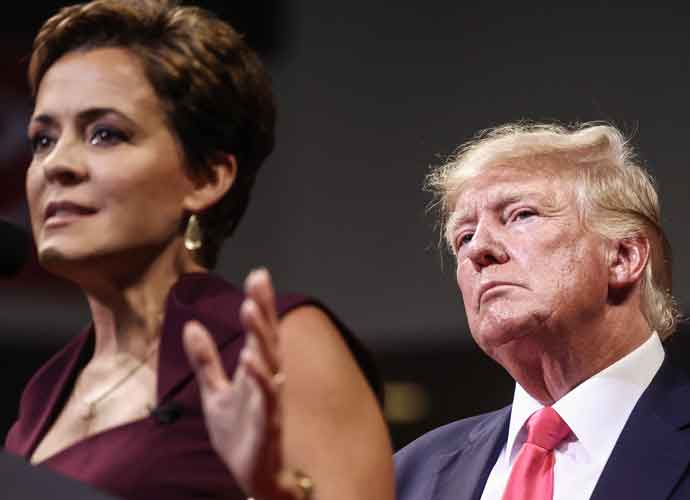GOP Senate Candidate Kari Lake Headlines A Campaign Fundraiser Hosted By QAnon Supporters
Republican Senate candidate Kari Lake recently headlined a campaign fundraiser hosted by Caryn Borland and Michael Borland, two supporters of the far-right political conspiracy theory QAnon.
On February 2, Lake attended this fundraiser with Caryn and Michael, which was held at their mansion in Prescott, Arizona.
Lake has been a supporter of Donald Trump‘s third presidential bid. She campaigned for him in Iowa before the caucuses took place. Some pundits even saw her as a potential vice president choice for Trump.
She launched her Arizona Senate bid in October 2023 but ended the year with a relatively small amount of money in the bank.
Lake raised $2 million in the roughly 11 weeks after having entered the race, but she immediately spent almost half that amount, meaning that she started 2024 with a little more than $1 million in the bank, as well as $308,000 in debt.
These numbers are low for a frontrunner in a major Senate race, and they show that Lake entered the 2024 election year way behind her major competitors.
Sen. Kyrsten Sinema (I-Arizona), who has not yet decided on a reelection bid, started the year with nearly $11 million in her coffers. Rep. Ruben Gallego (D-Arizona), who launched his campaign in January 2023, had almost $7 million in the bank.
Caryn and Michael have maxed out to Lake’s campaign. According to new FEC records, they each donated a total of $6,600 to her.
During her gubernatorial run, Lake had dinner with reputed top QAnon figure Ron Watkins and noted in July 2023 that she was given a huge response when appearing on the QAnon-linked internet show, X22 Report.
Lake has repeatedly repeated conspiracy theories in her speeches. She stated that she took hydroxychloroquine to prevent herself from getting Covid-19 and raised doubts about whether or not Covid-19 vaccines worked.
The Borlands previously were in the news when a fundraiser they were going to host in Montana for former Vice President Mike Pence was canceled after their association with QAnon was reported.
QAnon’s followers believe Trump secretly fought a cabal of Satan-worshiping child sex traffickers working in the “deep state.”
After it was reported in 2020 that the Borlands spread QAnon material on Twitter, now known as X, and Facebook, they made their Twitter accounts private.
Michael deleted QAnon content from his Facebook page, which included many QAnon logos, its oath and slogan, “Where We Go One, We Go All.”
In 2019, the FBI’s Phoenix field office had labeled QAnon a domestic terrorism threat. They stated in an intelligence bulletin that conspiracy theories like them are “occasionally driving both groups and individual extremists to carry out criminal or violent acts.”
In February 2022, two teams of forensic linguists tried to track down the identity of Q, an anonymous writer who claimed to be a government insider strengthening QAnon since 2017. The teams used a machine learning program to identify two men as the possible origin of Q.
This research was publicized in a New York Times report on February 19, 2022, and named South African software developer Paul Furber as the most likely person who made the very first Q posts. They also accused Furber of collaborating with Watkins to create messages under the pseudonym.
After a large number of messages Q initially shared on the platform 4chan, the conspiracy started taking hold among a group of right-wing activists. Q stated that he was a powerful government official, and wrote that D.C. is controlled by a cult-like group of cannibalistic child abusers consisting of powerful Democratic politicians, Hollywood actors and other well-known liberals.
QAnon believers think this cabal worked directly against Trump while he was in office and that he would mass-arrest and execute reported group members in an event called “the Storm.”
In a ruling made in December 2023 by Maricopa County Superior Court Judge Jay Adleman, Lake was ordered to substantiate the accusation she made against Maricopa County Recorder Stephen Richer in a defamation lawsuit.
Adleman said that the claims she made in accusing Richer of election sabotage were not just rhetorical hyperbole, as her lawyers argued.
The judge noted that these claims could be viewed as either true or false and therefore be viewed as actionable assertions of fact under Arizona law. As a result, Lake was obligated to show evidence in court supporting her accusations.
Adleman mentioned that Richer’s legal team presented sufficient allegations to establish a possible case of “actual malice” against Lake, her campaign, and the Save Arizona Fund, which was used for raising funds.
RELATED ARTICLES
Get the most-revealing celebrity conversations with the uInterview podcast!









Leave a comment